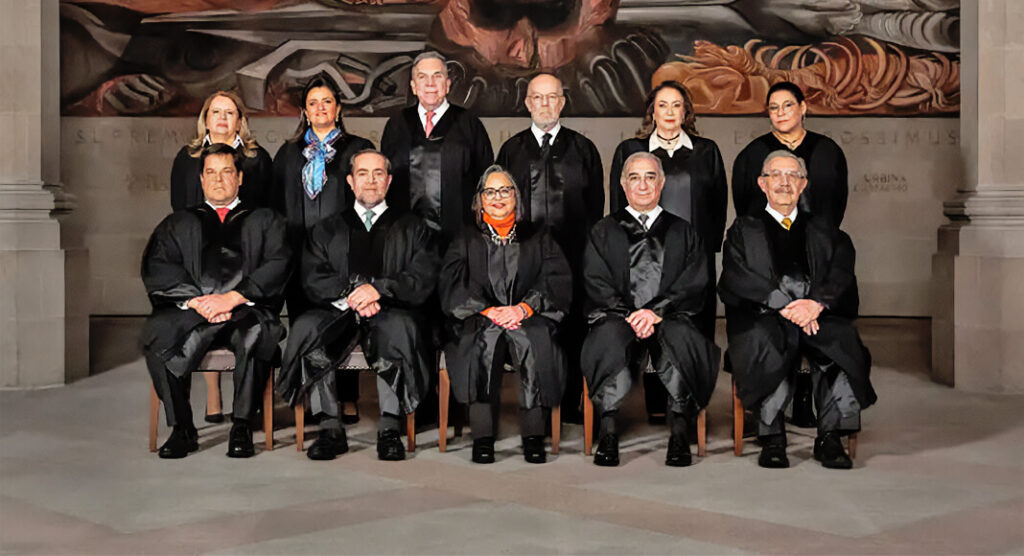
Texas Border Business
Texas Border Business
On October 30, 2024, Mexico saw an unprecedented shakeup as eight Supreme Court justices, including Chief Justice Norma Piña, submitted their resignations. This wave of resignations was sparked by Mexico’s recent judicial reform, which mandates that judges across all levels, including Supreme Court justices, be elected by popular vote. The resignations are set to take effect after the judicial elections scheduled for June 1, 2025, marking a critical juncture for the future of Mexico’s judiciary.

Norma Lucía Piña Hernández – Serving as the court president since 2023.
Luis María Aguilar Morales – Appointed in 2009.
Jorge Mario Pardo Rebolledo – Appointed in 2011.
Alberto Pérez Dayán – Appointed in 2012.
Alfredo Gutiérrez Ortiz Mena – Appointed in 2012.
Javier Laynez Potisek – Appointed in 2015.
Juan Luis González Alcántara Carrancá – Appointed in 2018.
Yasmín Esquivel Mossa – Appointed in 2019.
Margarita Ríos Farjat – Appointed in 2019.
Loretta Ortiz Ahlf – Appointed in 2021.
Lenia Batres Guadarrama – Appointed in 2023.
This court faces uncertainty, as several justices plan to resign or have expressed opposition to the new law, fearing it may impact the judiciary’s independence. Justices Batres, Esquivel, and Ortiz, appointed during López Obrador’s presidency, are expected to stand in the upcoming elections, indicating their support for the reform. Meanwhile, this transition marks a turning point for Mexico’s judiciary and has raised significant debates on judicial independence and political influence. Image source: scjn.gob.mx
The judicial reform, signed into law by former President Andrés Manuel López Obrador and supported by current President Claudia Sheinbaum, aims to democratize Mexico’s judicial system, which has long been criticized for corruption and elitism. President Sheinbaum and her Morena party argue that the direct election of judges will align the judiciary with the people’s interests. A key provision in the reform package is the “constitutional supremacy” bill, which restricts the judiciary’s ability to challenge constitutional amendments that Congress and state legislatures have ratified. Critics contend that this measure strengthens executive power over judicial matters, potentially undermining the judiciary’s independence.
Chief Justice Piña and her colleagues cited concerns for constitutional integrity and judicial independence in their resignation letters. Justice Alfredo Gutiérrez Ortiz Mena, in particular, voiced his apprehension that popular elections could erode the judiciary’s role as a non-partisan protector of minority rights, as judges might feel pressured to align with prevailing political sentiments rather than uphold impartial justice. Nonetheless, Morena party officials, including Senate President Gerardo Fernández Noroña and President Sheinbaum, have suggested the resignations stem from financial motives. According to their claims, resigning before the reforms take effect secures the justices’ pensions under the existing retirement terms, which may be more favorable than the reform’s.
The judicial reform has faced extensive criticism both domestically and internationally. U.S. Ambassador to Mexico Ken Salazar, among others, has expressed concern that the popular election of judges could compromise the judicial process’s impartiality, risking the checks and balances that underpin democratic governance. In Mexico, more than 400 lower-court judges announced they would not contest the upcoming elections, signaling a widespread sentiment of disapproval within the judiciary. This opposition marks unprecedented resistance to legislative reform among Mexico’s judicial professionals, underlining the depth of the institutional concerns at hand.
Despite the justices’ resignations, it remains within the Senate’s authority to accept or reject them. With Morena’s control over the Senate, the final decision will likely reflect party strategy, especially as the Supreme Court considers challenges to the reform’s provisions in the coming weeks. Suppose the resignations are accepted, and the judicial elections proceed as planned. In that case, Mexico’s judicial system will transform dramatically, potentially reshaping judicial accountability and recalibrating the balance of power between the executive and judiciary.
The reform’s impact on judicial independence is profound. Traditionally, the judiciary acts as a check on the executive and legislative branches. If political trends sway the judicial selection process, it may prioritize majority will over judicial neutrality, undermining the judiciary’s role in protecting minority rights and limiting government overreach. Such a shift in balance could also affect Mexico’s economic and social stability, as domestic and international trust in Mexico’s institutions relies on perceived judicial integrity. The judicial reform’s potential to alter the rule of law could influence everything from foreign investment to the continuity of domestic policies.
As Mexico approaches this critical juncture, close monitoring of the SCJN’s response to the legislative actions is paramount. The Supreme Court’s decision on whether to challenge the popular election provision will serve as a bellwether for the future of judicial independence in Mexico. Growing international and domestic scrutiny may pressure the government to adjust its reforms to safeguard judicial integrity while enhancing accountability.
The mass resignation of eight Supreme Court justices has intensified debate around Mexico’s judicial reform, highlighting deep concerns about judicial independence and the rule of law. This unprecedented transition accentuates a critical moment for Mexico’s democratic principles and institutional checks and balances, and the outcome of this reform will shape the future role of the judiciary in Mexico.
See related story:














